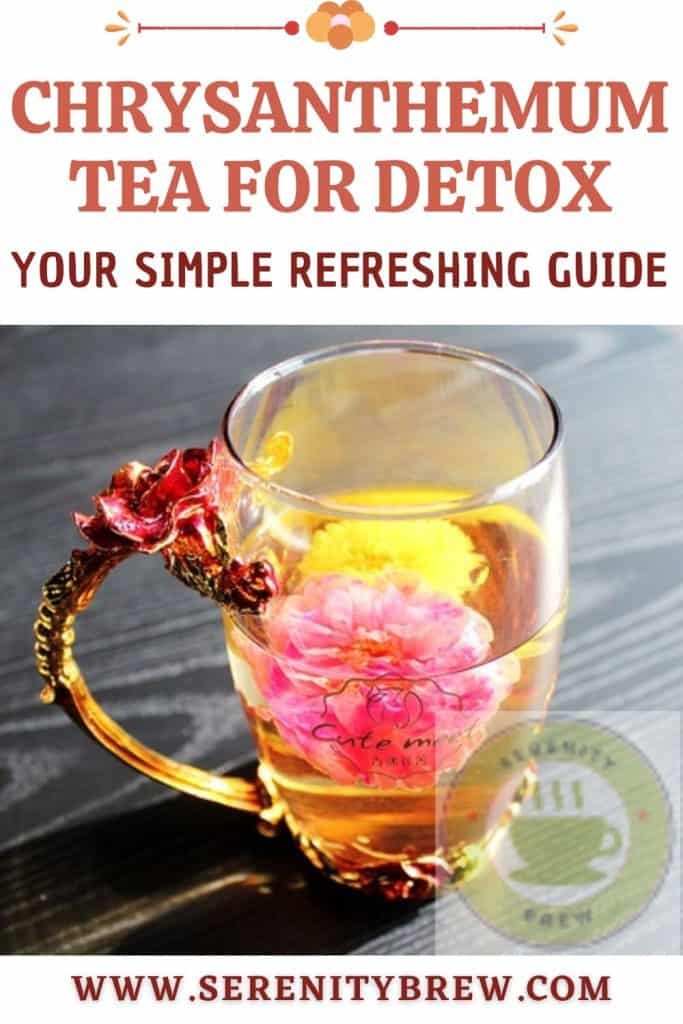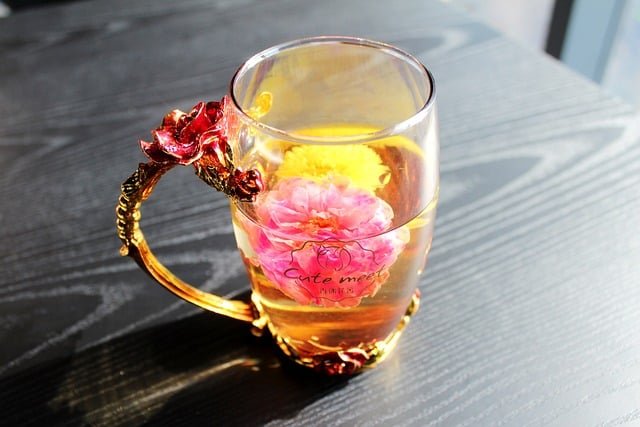
Chrysanthemum tea is a popular herbal infusion known for its detox properties and various health benefits. It’s made from the flowers of the chrysanthemum plant, which has a long history of medicinal use, particularly in Chinese medicine.
The tea is traditionally used for “cleaning heat and toxins” and “scattering cold,” making it an ideal choice for detoxification. With a pleasant taste and golden yellow color, chrysanthemum tea offers a relaxing and enjoyable way to support your body’s natural detox processes.
Health Benefits of Chrysanthemum Tea
Chrysanthemum tea, made from yellow or white chrysanthemum flowers, has a number of health benefits that can aid in detoxification. Traditional Chinese medicine has long used this herbal tea for various conditions. Here, we will discuss its antioxidant properties and anti-inflammatory effects that contribute to its detoxifying abilities.
Antioxidant Properties
Chrysanthemum tea is rich in antioxidants, which play a crucial role in protecting the body from harmful free radicals. These molecules are known to cause damage to cells, proteins, and DNA, which can ultimately lead to various diseases and aging.
- Flavonoids – Chrysanthemum tea contains a variety of flavonoids, which have been reported to possess potent antioxidant properties.
- Beta-carotene – This tea also contains beta-carotene, which is converted into vitamin A in the body, offering additional antioxidant benefits and supporting eye health.
Anti-Inflammatory Effects
Another health benefit of chrysanthemum tea is its ability to help reduce inflammation in the body, which is directly related to its detoxification properties. Inflammation is often the body’s response to toxins and can contribute to various health issues if left unchecked.
Some studies have demonstrated that chrysanthemum tea can help:
- Reduce inflammation in the body
- Decrease symptoms associated with respiratory conditions
- Relieve headaches and fever
The combination of antioxidant properties and anti-inflammatory effects makes chrysanthemum tea a valuable addition to a detox regimen.
Chrysanthemum Tea for Detox
Chrysanthemum tea has been used in traditional Chinese medicine for its detoxifying properties. This section will explore its role in liver detoxification, kidney detoxification, and aiding digestion.
Liver Detoxification
Chrysanthemum tea is believed to help promote liver health and detoxification. It has been traditionally used to cleanse the liver and remove toxins, which can help improve overall wellness. Although clinical evidence is limited, anecdotal reports suggest that regular consumption of chrysanthemum tea may have a positive impact on liver function.
Kidney Detoxification
In addition to supporting liver health, chrysanthemum tea is also thought to assist with kidney detoxification. It is said to help the kidneys filter waste and improve their functioning. While more research is needed to confirm these claims, chrysanthemum tea may be a helpful addition to a kidney detox regimen.
Aiding Digestion
Another potential benefit of chrysanthemum tea is its ability to aid digestion. It has been reported to help soothe the stomach and alleviate digestive issues like bloating, indigestion, and constipation. It is believed that chrysanthemum tea’s anti-inflammatory properties may help reduce inflammation in the digestive tract, making it an excellent choice for individuals seeking a natural way to support their digestive health.
Chrysanthemum Tea Recipe for Detox
Chrysanthemum tea has numerous health benefits, and one of them is its detoxifying properties. This simple recipe will help you brew a refreshing cup of chrysanthemum tea for detox purposes.
Ingredients:
- 8-10 dried chrysanthemum flowers
- 3 cups of water
- 1-2 tablespoons goji berries
- 1 tablespoon honey or stevia (optional)
Instructions:
- Rinse the dried chrysanthemum flowers and goji berries under cold water to remove any impurities.
- Place the flowers and goji berries in a teapot or heat-resistant bowl.
- Heat the water in a saucepan until it reaches boiling point, then let it sit for one minute or until it’s about 100 degrees Fahrenheit.
- Pour the hot water over the flowers and berries, and let them steep for about 5 minutes or until the water turns golden yellow.
- Strain the tea to remove any remaining flowers and berries.
- Add honey or stevia for sweetness, if desired. Serve hot or cold.
For optimal detox benefits, consider drinking 2-3 cups of chrysanthemum tea daily. The tea can assist in clearing toxins from the body, reducing inflammation, and promoting overall health and well-being.
How to Prepare Chrysanthemum Tea
Choosing Quality Chrysanthemum Flowers
When preparing Chrysanthemum tea for detox, it is essential to choose high-quality, organic flowers to ensure you are maximizing the tea’s health benefits. When selecting fresh flowers, pick ones that are bright in color and free of spots or blemishes. If you are using dried flowers, they should have a pleasant aroma and retain a vibrant yellow hue.
Brewing Techniques
There are two main brewing techniques for Chrysanthemum tea: hot brewing and cold brewing. While both methods yield a delicious and detoxifying drink, the brewing method you choose may slightly alter the flavor of the resulting tea.
Hot Brewing
To hot brew Chrysanthemum tea, follow these steps:
- Boil water and let it sit for one minute or until it’s about 100 degrees Fahrenheit.
- For every 8 ounces of water, add 3-6 whole mum flowers.
- Let the flowers steep for about five minutes (until the water becomes golden yellow).
- Strain the flowers.
- Add sugar substitutes, like honey or stevia, if preferred.
Cold Brewing
To cold brew Chrysanthemum tea, follow these steps:
- Put Chrysanthemums and water in a pitcher or glass container.
- Add cool or room temperature filtered water and stir in the Chrysanthemums.
- Refrigerate the mixture for at least an hour or until the desired strength is achieved.
- Strain the flowers and serve chilled.
Regardless of the brewing method, it’s essential to properly clean the flowers before use. Gently wash the flowers under light running water or in a bowl. You can choose to pluck the petals or use the entire flower for your brew. Adding the washed leaves can also enhance the flavor and health benefits of the tea.
Precautions and Considerations
Before incorporating chrysanthemum tea into your detox routine, it’s important to be aware of certain precautions and considerations:
- Individuals with allergies to plants in the Asteraceae family (ragweed, daisies, marigolds) should avoid chrysanthemum tea, as it may trigger an allergic reaction.
- Those taking blood pressure or blood thinning medications should consult their healthcare provider before consuming chrysanthemum tea, as it may interfere with the effectiveness of these medications.
- Pregnant and nursing women should exercise caution when consuming chrysanthemum tea, as its full effects on the developing fetus and infants are not well understood.
When choosing chrysanthemum tea, pay attention to the quality of the product:
- Opt for organic and pesticide-free varieties to ensure that you’re consuming a cleaner, healthier product.
- Check the product’s source information to ensure that it comes from a trusted supplier who adheres to good manufacturing practices.
Lastly, it’s important to remember that chrysanthemum tea alone is not a cure-all solution for detoxification:
- Maintain a balanced diet with a focus on fruits, vegetables, and lean proteins.
- Drink plenty of water and stay hydrated throughout the day.
- Include regular physical activity to support your body’s natural detoxification process.
Conclusion

Chrysanthemum tea is a refreshing beverage with potential health benefits that can support detoxification. Rich in vitamin C, iron, calcium, thiamine (B1), and choline, this tea may aid in maintaining good health.
Preparing chrysanthemum tea is simple; steep the dried flowers in hot water for about five minutes and strain before enjoying. Sweeteners such as honey or stevia can be added based on personal preference. Cold brewing the tea and storing it in the refrigerator is also a delicious and beneficial option.
While the health benefits of chrysanthemum tea are mainly anecdotal and based on limited studies, there is no harm in incorporating this tea into your detox routine. However, it’s always advised to consult a healthcare professional before making significant dietary changes.
